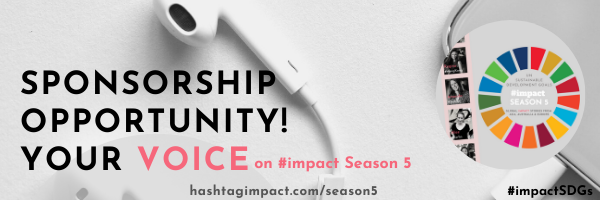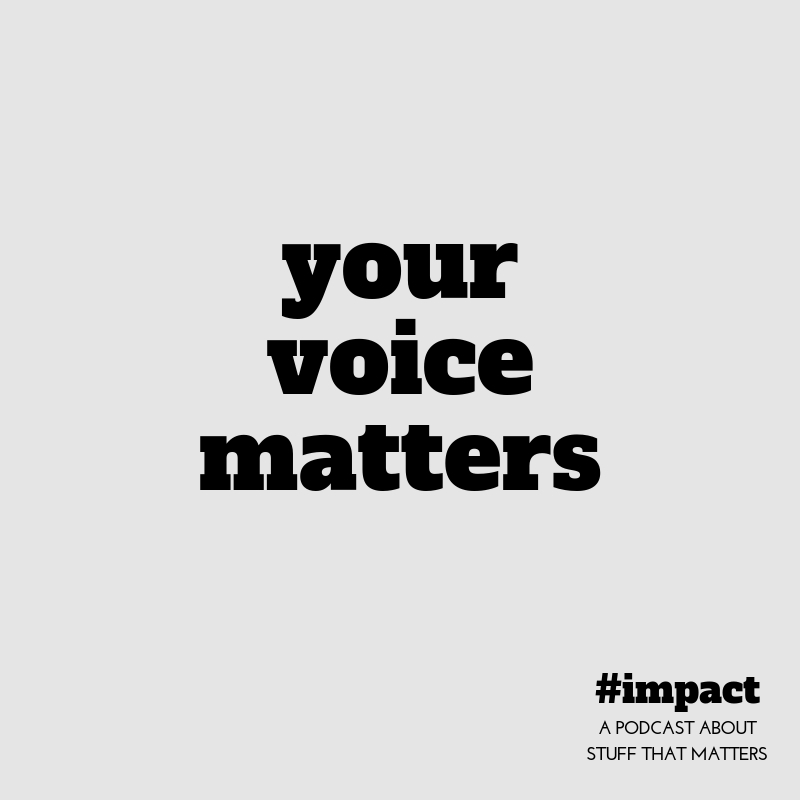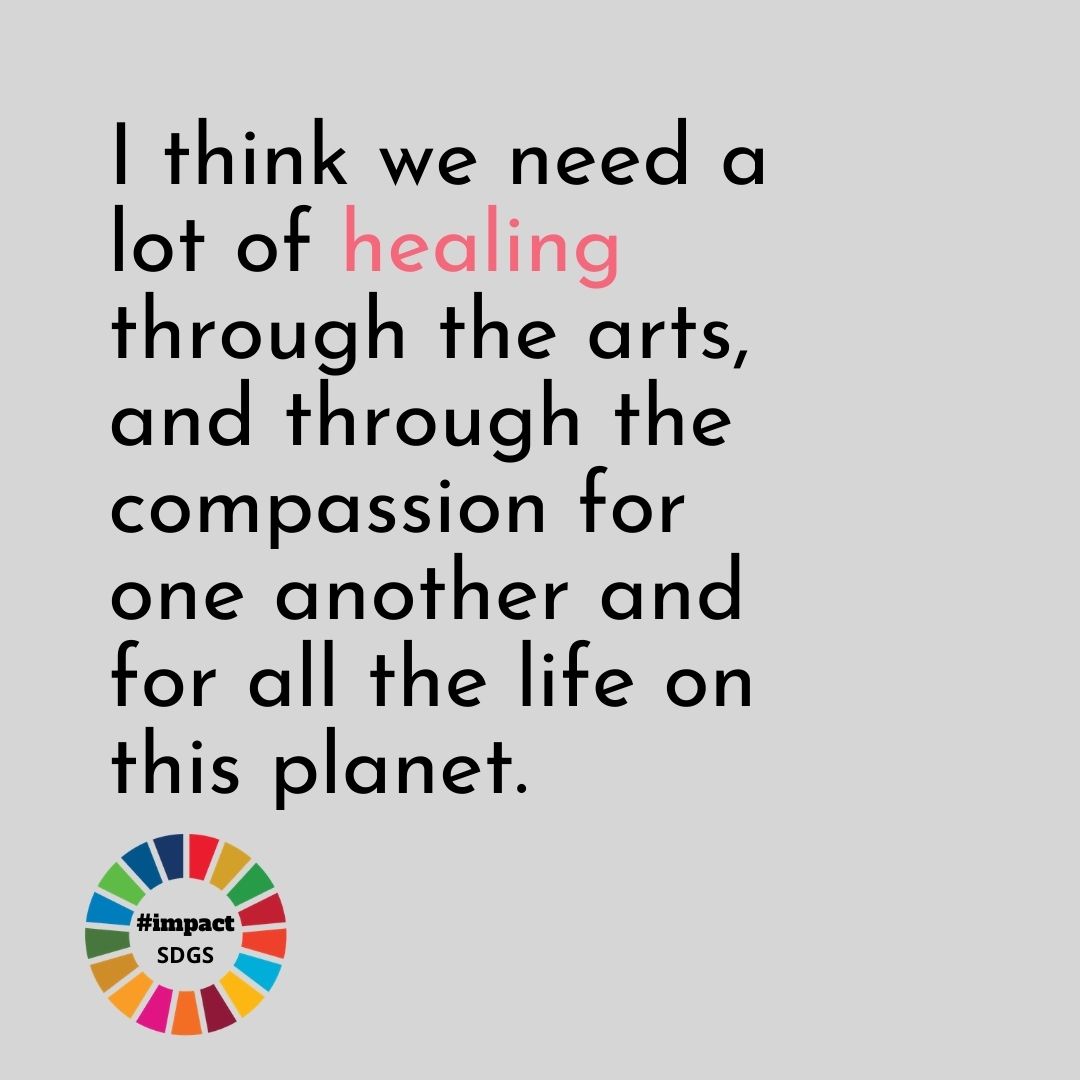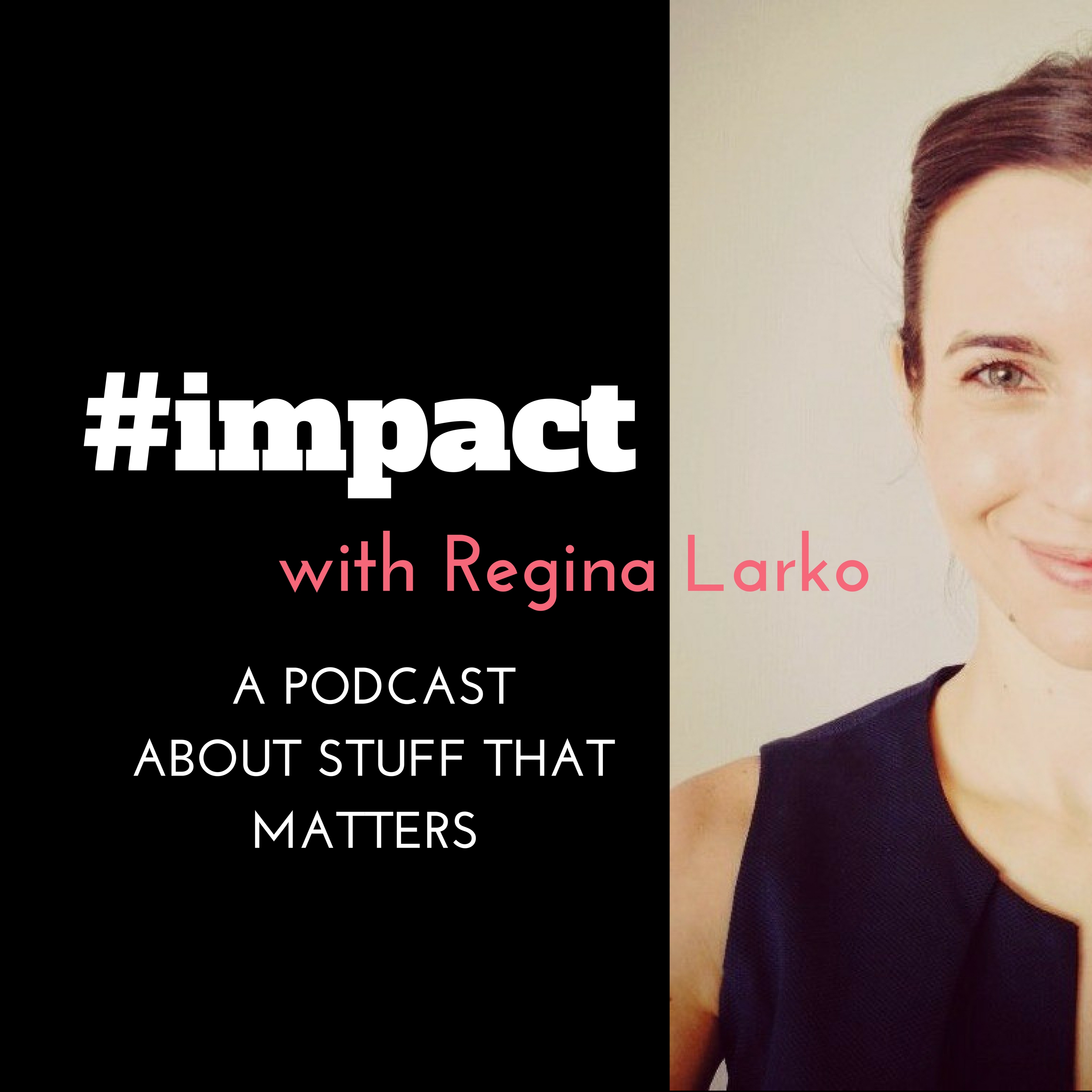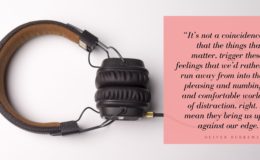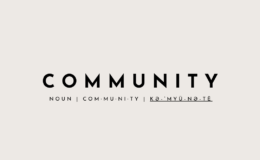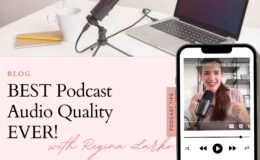Full transcription of our conversation with Dr Ying Ying Liu, Founder of LumiVoce
Find the summary, our favourite quotes and all links mentioned in this episodes in our show notes here.
Regina Larko 0:01
You cannot get through a single day without having an impact on the world around you. What you do makes a difference, and you have to decide what kind of difference you want to make. This is a quote from Jane Goodall, a woman that is a great inspiration to today’s guest. I am Regina Larko, and you are listening to #impact, A Podcast about stuff that matters. In this Season 5, we track down change makers across the globe that tackle the Sustainable Development Goals. Find more information about this show at www.hashtagimpact.com. Let’s begin.
Today I am sitting down with Dr. Ying Ying Liu, founder of LumiVoce. Ying Ying cares a great deal about the future of life on this planet.
Trained as a classical pianist and singer, she traveled the world performing. After learning about the devastating state of global wildlife loss and nature destruction she decided to devote her energy and time to inspire and engage with people, especially the young generation to care, love, and protect wildlife and nature, through the power of the arts, creativity, and education. She believes just knowing is not enough we must get from knowing to caring to action. And today, Ying Ying, we will hear all about how you take action. Ying Ying, welcome to #impact, I can’t even say the name of my own podcast. I can’t even say the name of my own podcast because I’m so excited! Welcome to #impact! You know, I’m so excited to finally have you in front of the mic, because this has been years in the making.
Dr. Ying Ying Liu 2:13
Yes, it has been a long time we’ve been planning this, it’s absolutely a great pleasure for me to be here with you, Regina. And I can’t wait to share with audiences our — my — story and how I founded LumiVoce and the why behind all of that.
Regina Larko 2:33
Yes . And you know, in this season of #impact podcast, Season 5, we are addressing the Sustainable Development Goals. And I was so excited to, I’m excited to talk all of my guests of course, but I think for you in particular, there are many different SDGs actually, that your work touches upon and we’re going to get into many of them as we are going through this conversation.
But first of all, can I just share that little story how I first heard about your work and how we got to know each other. It was actually through TEDxTinHauWomen, a few years back, and there were a lot of inspiring speakers. And then there were also some amazing women chosen out of, I don’t even know how many applications there were hundreds, I think. And there were a few women that were chosen, that would share their audio story at TEDxTinHauWomen. And I was the one producing it.
So I sat down with these amazing women and one of them was you. And all of you had prepared these beautiful scripts of you know why what you’re doing, in your case with LumiVoce. And what I love most about that recording that day, when we sat down was that you read your script, and we did it a few times, and then we kind of stopped the recording. You know, we had our, we had, we had it in, you know, we got it — cut. And then I asked you, but you know Ying Ying I mean, why? Why did you start this in the first place?
And I heard something, and I hope but maybe I can even dig out that original recording we did, because your voice actually changed. And all of a sudden, you started to tell your story and I really wanted from that moment on my listeners to hear that story. Can you share with us first of all, what is LumiVoce, maybe just like one sentence, like what are you doing there and why you started it in the first place.
Dr. Ying Ying Liu 4:50
Yeah. Well, gosh, one sentence that’s a huge challenge. LumiVoce really is — what we do is to inspire people, but especially the young generation, to really fallen in love with wildlife, and nature because I truly believe that we need to connect with people, not just in the head, just knowing, but hearts. And there’s nothing better than music and the arts to connect directly with people’s emotions, so that they would fall in love with the beauty of wildlife and nature. Only when we fall in love that we will protect that. So, so to fall in love with wildlife and nature in order to protect it, that’s what we do. And it’s all done through art and creativity. That’s a little bit more than one sentence, but…
Regina Larko 6:00
That’s totally fine! And we’re going to hear even more, I mean, of course, you’re going to hear all about the projects that you’re running right now. There’s so much happening over at LumiVoce. I know Ying Ying and I heard this in another amazing podcast, shout out to Ran Elfassy from Shooting it RAW, he’s amazing. And you should definitely also check out the interview that Ying Ying did over at Ran’s show because it was beautiful. It touched me deeply.
And what I heard there, and what I was curious about, of course is your upbringing. You grew up in a house of the arts, I would like to say. Your dad, a composer, your mom, a painter. This is something that is I think, just ingrained in you. And I know it was one of your childhood dreams also to use your art to inspire and educate people. Exactly what you’re doing now. Right? Yes, but thinking back like of your childhood growing up in a house like that. I’m just so curious. Like, was there was nature already part of your passion then as well? Or when did the nature become part of your of your art quest as well?
Dr. Ying Ying Liu 7:28
Very good question, Regina. I grew up in the 60s. I still remember when I was a kid practicing my piano on a brick bed, right in the northeast China because it’s too wet the floor, so we have to put the piano, our German piano, on the brick bed away from the muddy floors because we live in a mud hut.
And, and that’s how I started learning music. And soon before we didn’t have electricity at first so my dad was teaching me how to read music over a kerosene lamp first to learn the music and then later on, we have the electricity coming in, just one line, and I still remember the pressure. The vaults are not stable so that when we listen to our old record player of the records that still left that the keys keep changing, you know, for instance, because it’s sometimes fast, sometimes slow sometime, the key changes. Very interesting period.
But it’s the music, it’s the light that shines through that sound through that music, that it’s just so divine. And because we’re in the countryside, we’re surrounded by you know, nature, and also animals.
We have all these animals around us whether it’s farm raised or or they’re running around, mostly farm raised, but and but also frogs and other little wildlife in the countryside, squirrels and snakes. And so we actually I was just, I love animals when I was young, but that’s the seed, right? You’re close to nature.
And then I was educated in classical music during this hard time. But then when I started I went to the US to study at Eastman School of Music, that’s where I got my doctorate degree in music, piano performance and literature, as well as studied classical singing. I started traveling the world. That’s where I saw the state of nature, the beauty of it, and also the devastation.
A couple of stories if I, you know may share with you, is we went to Mexico and we went with National Geographic researchers and they research on whales. So we went with their small boat and we were able to very respectfully, not a not a huge motorboat, a very small bugs only took about six people and very respectfully followed this giant mother whale and her calf very closely, probably 20-30 meters, at the most, that were that close to them, and just to so close to them, their presence was so amazing.
And along the way, these playful dolphins will come and tease you, you know, they look at you and they tease you, and they swim by our boat exactly the same speed as the boat. No matter if you go fast or slow. And then the most amazing thing is one of the researchers put this deep ocean mic about 56 meters into the ocean, that’s when you hear whale songs through the mic. I can’t tell you as a musician, I mean just that sound it goes right through you into your the deepest part of your heart and even their soul. If one believes in soul, I think it just it really touches your spirit. I will never forget that sound how hauntingly beautiful. So that’s one encounter.
Another encounter is when we went to Alaska, everybody probably knows Alaska, it’s such a prestigous you know, nature kind of a natural nature reserve for the planet. And we get to see all kinds of wildlife whales, lots of bears, bald eagles, and the incredible glaciers, and even saw one amazing gray wolf on the other side of shore. We took a very small boat, not those giant 5000 people boats, less sustainable, but we took a small boat took 12 people and going through the inner passage, what I saw the beauty, it’s incredible, but also saw the devastation.
You know why? Because we at that time, I’m still not a vegan yet, so we still fishing on the boat and we setting shrimp traps and for the next meal basically, and the captain has been operating in these waters for over 20 years so he really knows the waters very well. So we set up four shrimp traps and can you can you guess how many shrimps the next day we we took it out how many shrimps we harvested?
Regina Larko 13:22
No idea.
Dr. Ying Ying Liu 13:24
No idea. Well, six in four big shrimp traps, and that’s the devastation, one of the devastations I saw. The captain said it used to be when they said the shrimp traps down there, two hours later, they’re completely full. But in this case, we set it down in the afternoon while we docked, and then the next morning we took it off and they were six pathetic number, six shrimps.
That ocean is increasingly becoming empty, also in the waters we saw millions of tiny little jellyfish. They were not supposed to be there at all. And so I asked these people why they’re even there and they said is because the ocean the acidity and the pollution and acidity, it’s so high and and we are we’re fishing over fishing and so it’s destroying the ecosystem.
And the glaciers. We saw the beautiful glaciers, we got very close, and the glaciers we talked to the other scientists and they said the glaciers at that time, this is nearly 10 years ago, yhey said in about 20-25 years the glaciers may be gone forever. And so that’s one of the things, the couple of trips I just want to share with you, that really got me thinking what can I do? That’s what prompted me about thinking about really do something to make an impact. I guess the question to ask is that what is the future of life on this planet? You know, what can we do to help to make sure that we do have a future for all the lives that depend on the ecosystem, depend on an intact biodiversity, the web of biodiversity.
Regina Larko 15:37
And that actually hearing your description of, you had this devastation this pain you also felt, I hear it through your voice that actually makes me reflect on on something I have noticed throughout your work and the way you communicate, the concerts you organize, that way you tell your stories also on your website, there is a language you use that is gentle, and focused on healing our relationship with nature. And, is this intentional?
Dr. Ying Ying Liu 16:28
Absolutely, Regina, you’re very, you’re so observant. I think we need a lot of healing through the arts, and through the compassion for one another and for all the life on this planet. I think we do need to keep a gentle heart and keep a positive heart and we need to inspire people to care. If you actually care, you will feel gentle in your heart, because caring and loving, compassion, comes from a very soft place, and I think these are very important core qualities that we definitely tried to be, not be part of, to really, you know, practice, to really it’s in the core spirit of LumiVoce.
So love, beauty, compassion, gentleness and care, these are the things at the core of what we do. I think if we can really focus on these things, they will be much more. I don’t know it’s just much less destruction because if you love you cannot go killing. If you care, you will not destroy, right. If you have gentle, your compassion, you will be more mindful to others and this others is both including other humans, fellow humans, also fellow earthly beings, other life forms, because I truly believe not just that we need them for our own survival, but they have just as much right to be here to live their own natural life as us humans.
If we really truly talk about inclusive, inclusiveness, both social inclusiveness in the human world and biodiversity inclusive, bio inclusiveness, we ought to look after our environment, our fundamentals of ecological health, because without them, we won’t be able to survive.
I’ve heard you know, I was very much inspired by some great artists that are doing fantastic work in the space of using arts for conservation. One of my heroes is Louis Schwartzberg. He has these series of moving arts where he talked about, you know, that we actually depend, 1/3 of our food and fruits are coming from bees, bats, butterflies, all these pollinators, little insects. We depend on them. We depend on ants, on all these little insects, and flies to break down the food. Without them we will live in more garbage, right? We depend on sharks to be able to maintain, and turtles, to maintain a good healthy ecosystem, we depend on whales to have a healthy ocean, because they when they breathe up and down in the ocean going up and down, and they actually whale poops, help degenerate planktons and so that to observe all that carb and then heat, so, I mean, we’re interconnected, we’re interconnected with our environment with nature and with other life forms.
We, the great ocean, which Hong Kong lives by, it’s, we ought to be more really thinking about the ocean, how we look after instead of trashing out all the plastics, throwing out, Hong Kong throws out this is a statistic is a couple years old, Hong Kong throws out 5.2 million single use plastic bottles every single day. Now how can we reduce that and the tons and tons of plastics.
So I think if we actually keep that gentle heart you’re talking about, and really keep that compassion, and keep that gentleness I think we will care more. If we care more, we will actually take actions towards that end. To have better actions to live a more sustainable life. And same with why we want to engage through the arts. It’s so beautiful, and it’s creative, it’s also help with human beings with better well being when you look at these beautiful colors, when you look at nature, when you work with beautiful healing sounds, I think specially with COVID.
And we really can benefit all around with the arts, but most of all, if we can really focus the SDG have a better quality education, through that, through partnerships, which is Goal number 17 in SDG. What we can support is Goal number 13, 14, and 15, you know, land in the ocean, life on land, and also partnerships and have and also maybe 12 to reduce the consumption. So I think SDGs are wonderful and and I think we can do a lot more there, using our beauty, gentleness, compassion, creativity, and the arts. And I’m a true believer.
Regina Larko 23:03
Absolutely. And I, I want to encourage everyone who may be is new to the Sustainable Development Goals, I’m sure some listeners will be, to educate yourself on that as well, you know, just google “Sustainable Development Goals” and you can find all these references that you just made to the different numbers of the goals, if you were like wondering, like, what do those numbers actually mean? Because they’re all, first of all, these 17 goals are all interlinked as well, we need to focus on all of them to make the world truly sustainable and reach the Sustainable Goals set out in this agenda. But also, you will see how they relate to you.
And I actually made a little episode on that as well. If you want to go back and have a look, the episode, you find it on www.hashtagimpact.com/season5, you will find it right there on top where you can see why do the SDGs matter? How do they relate to you and what can you do, so that just as a little plug, if you want to learn more about the Sustainable Development Goals. And you said something there Ying Ying, that I instantly, that I want to pick up on and I know that maybe hopefully, in a few years time when one of our listeners is listening, maybe in five years time it will just be a distant memory but today we are living the reality of, in spring 2021, living through a global pandemic.
How do you actually, how do you with LumiVoce bring nature closer to your beneficiaries, to the young students, in a time that it has become so remote? How do you do that?
Dr. Ying Ying Liu 24:53
Very good question Regina. We have even since last year we’ve struggled with it, right, but so that’s why one of the key efforts this year, this last year that we have put all of our Voices for the Planet challenge for kids to get involved engaged, all online and through Zoom. In fact, good news, so on the day of our fifth year anniversary…
Regina Larko 25:31
Today! Let’s get this on the record! Wait, sorry. Yes. 15th of April 2021.
Dr. Ying Ying Liu 25:39
Yes, yes. So. So it’s exactly five years ago that I founded in LumiVoce. So. So on this day, I’m very happy to share with everyone that we were this year, we had exponential growth in terms of engaging with schools and students.
We have 13 schools engaged this year for the Voices for the Planet, both in Hong Kong. And also in China, we have 6000 plus students are going to be participating in this right now.
And starting this weekend, Saturday, we have engaged with, we are starting with 13 artists workshops, trying to support students with their own creative skill development, for entering, you know, Voices for the Planet challenge in the five art forms and eight challenges.
So they can sing a song about wildlife and nature, they can draw, they can make a video, or they can take up photography, and they can write a story, which is just amazing. So this is what we’re doing, I think we’re bringing, through technology, we’re bringing nature to the young, through technology through online access, and they can still work with their hands with a simple, even if you just have a pencil, you can still draw, right? You can still write. And if you have a phone, you can go out there and take a wildlife photo. And you can make a simple video, you can sing a song, definitely. So these are the various ways I think, one is it’s creative, the other one is uplifting, for kids to be able to think about, not just themselves, but the future that they are protecting, and they’re going to be living in.
It is their future that we’re protecting. And, and it can be very beautiful, can be very expressive, and it has also, you know, wellness benefits. If you think about nature, if you look at nature, if work with beauty, it will be wonderfully, loving, to your spirit.
Regina Larko 28:07
Absolutely. And I remember again, something you shared with Ran in that podcast about the sound of a forest, it really intrigued me and, you know, just by listening to you, you already made an impact because I listened to that conversation, and I didn’t have the chance to walk through a forest while I listened to your, your conversation, but I was actually outdoors.
I often listen to my podcast when I’m walking, and I actually did stop, because I noticed there were some birds chirping, and I hadn’t heard it before. You know, I hadn’t noticed them before they were there with me, but I was too busy to, to kind of notice them. So I think that there is, of course a common passion that we share for the power of sound. And we talked a lot about crafting now and the different art forms, but of course, you and your voice, your beautiful singing has been very much part of this LumiVoce journey as well, and I just want to bring up this gorgeous concert that I could tune into, and I hope there going to be more of those, and it was also there was also healing in the title right? Remind me of the title.
Dr. Ying Ying Liu 29:28
It’s Hear&Heal
Regina Larko 29:31
Hear&Heal. I wanted just want to say thank you, thank you for that. It was December, it was Christmas time, and it was truly healing for me because it was a time where where I would usually see my family. I would go you know travel, it was healing in a sense that through the own things I was living through, I actually, you put it in a bigger context for me. You know, like, it’s, we all have our own little problems as humans, big or small, but then I understood like through that concert and through all these artists that were involved and the stories that were told with this beautiful music, that we are just a little, little, little, little piece in this beautiful earth, and especially now, with Earth Day, that is celebrated. It reminded me of that it took me, it kind of took me out of my personal, you know, issues with homesickness, and actually put me… I felt more part of this earth, so thank you for that.
Dr. Ying Ying Liu 30:44
Wonderful, Regina. Yeah, that’s definitely you know, that’s the the other part, a core of LumiVoce, we’re engaging, not just myself, but we engage with all these professional artists, and that’s one of the concerts that we did Hear&Heal in December is that we had, you know, artists from five time zones, which was was very interesting, each have their own story, why they cared, you know, through their art, about the planet, about wildlife, which was very, very touching, in a way.
And, truly we wanted, we know families, you know, like yourself, like myself, we weren’t able to see families and so we were hoping that as a platform, people can actually connect, you know, online, but hearing beautiful healing music with one another as if they are there, right, to connect heart to heart and connect to a bigger and beautiful world so that we know we’re not alone.
But we are also we need to care about this bigger world, because we are part of it, and we all know where a pandemic came from, from animals, and we’re infringing too much on nature. And it’s jumped over, right. At least one of the theories, they’re still exploring scientists, but I think that is what part of LumiVoce that we continue. That’s why we now engage around 20 artists for different art forms, and for them to continue to share their art, their passion, with everyone. And that’s where hope to continue to do so, anybody who listens to this, and we have, you know, we also have six NGO partners that we have 13 schools, we have 6000 plus students. If you’re interested in LumiVoce and what we do, check out our website www.lumivoce.org, and all of our information are there. And I hope that you continue to, you know, be part of the voice for the wild and voices for the planet.
Regina Larko 33:05
Absolutely, because that is, of course, you need the support, right? I mean, that’s one of the biggest challenges for every, like nonprofit, how can you fund your activities and especially now scaling up with more and more students and I noticed exponential growth last year. I know there were like 200 students, now you have to take care of 6000 I mean, that’s amazing. And at the same time, like I can imagine like absolutely overwhelming to deal with that.
So can we do this you know, call to action for everyone listening here right now? Like how could they like support could they make a donation I guess, are you looking for like corporate partners to collaborate on a bigger scale schools. Who should be approaching you now?
Dr. Ying Ying Liu 33:57
Okay. Let me say this I think everybody who’s listening, if you can contribute in the way that is suitable for you, we are absolutely welcome that, so individuals, if you want to make a donation, go to our website at www.lumivoce.org, and there’s a donation on the first page. You can donate whatever that you feel comfortable.
Corporations, we absolutely will welcome you to support our program. We are in the middle of Voices for the Planet this year, and this is an annual project. This is our second year and we had 6,000% growth and, good problem to deal with, not a problem. It’s a challenge. And we absolutely welcome your support and just reach out to us and for schools if you want to participate, again, the Voices for the Planet, all the information is on our website.
And for Community Action people, sustainability people, please help us spread the word. If you have, you know we’re especially looking for people with marketing skills and professional skills, website design, visual design, or social media people, if you want to contribute through, you know, just putting in some hours to help us just spread the word. That’s another way.
Regina Larko 35:38
Fantastic. And Ying Ying, you know, I won’t let you go until you go through the quick fire round with me. Are you ready for this?
Dr. Ying Ying Liu 35:46
Okay. All right, well.
Regina Larko 35:48
All right. Who inspires you in the way they are tackling the Sustainable Development Goals?
Dr. Ying Ying Liu 35:57
Jane Goodall, Dave Attenborough. Jane Goodall is absolutely my role model. And there’s many many, you know, in the community to like Jill Robinson, and others, but Jane Goodall. I was very impressed. And very, you know, she’s absolutely my role model; at 80 plus something, she’s still traveling the world more than 300 days a year, continue to give her strong voice for wildlife and for conservation. Amazing.
Regina Larko 36:33
And what could everyone do right now, after they listen to this podcast, to make the world a better place?
Dr. Ying Ying Liu 36:43
Reduce your consumption. Contribute to a charity, can be LumiVoce, or any other charity that tries to make an impact, and spread the word, and become mindful, sustainable individuals. Support the future of life on this planet.
Regina Larko 37:10
I love this call to action. I think there’s something in there for everyone. And what I also invite you to do you know, check out www.lumivoce.org. On the website you find everything, get in touch with Ying Ying and also hear her voice.
You know, I mean, you we didn’t have you sing now! You have this amazing voice and I love the videos that I could also find on your website, where you are combining your voice with this beautiful art, artwork, video work. It’s a piece of art, you know, looking at this creations and this is a teaser now for the for the you know, for our listeners to actually go to your website and check it out for yourself. How you are creating art and making people care about wildlife.
Dr. Ying Ying Liu 38:02
Well, I have a challenge for the audience. If you go to our website and click on the YouTube link you you will hear the the three music track video tracks that I sang, and find out how many wildlife sounds you can hear from those tracks because it’s not just my voice in there, we have a combined, by producer Robert Copeland, you know, we work together to combine all the wildlife sounds into the track. So that’s the challenge.
Regina Larko 38:37
This challenge I’m up for it! I’m going to add the link also in our show notes for quick access, and I want to say thank you so much Ying Ying. I’m so happy that finally after, I think it must have been three years, because I had like another two kids in between. I’m calculating from that first day I heard your story recording for TEDxTinHauWomen to now sitting down with you and hearing a bit more of the details.
And I think we could talk for another four hours too go really deep. I would actually have a million more questions for you now hearing your story. But I know that we will catch up and we will hear more from you in the future as well. Thank you so much for today.
Dr. Ying Ying Liu 39:22
Thank you so much Regina for having me and thank you for the audience that is going to be here for this podcast and for our conversation. I’m really looking forward to catch up with you.
Regina Larko 39:34
Yeah, talk to you soon. Bye. Thank you so much for joining us today.
I have another little secret to share. I mean, I don’t know if it’s a secret for everyone. You might already know about this. But maybe not. I not only run my own purpose driven podcast production, #impact. But I also teach other people how to start their impactful podcast. And I’m so proud of the amazing students that have already graduated from the program and are now running their own podcasts. I mentioned a podcaster here today.
So Ran is definitely one of the podcasters that received some of my great advice. But there are even more, there is the Stories for the Future podcast, In Conscious Conversation podcast. We have the Belinda Esterhammer how, we have Raise the Bar, an amazing podcast empowering women to get funded faster and many many more.
If you also want to start a podcast but you’re not quite sure where to start, or how to start, you can check out my podcast guide, a free guide that talks you through the most important steps how to get started. And also a few recording tips so that you can set up for your first podcast recording even more confidently. You can find this guide over at www.hashtagimpact.com/guide. And if you have any like burning podcasting question that I could help you answer, you can also just drop me an email at regina@hashtagimpact.com. Yeah, so the secret is out. And if you want to start your own podcast, I can definitely help you out. That’s it for today. Talk to you soon. Bye.
Helpful resources to educate yourself on the Sustainable Development Goals
Get notified when our next episode airs!
